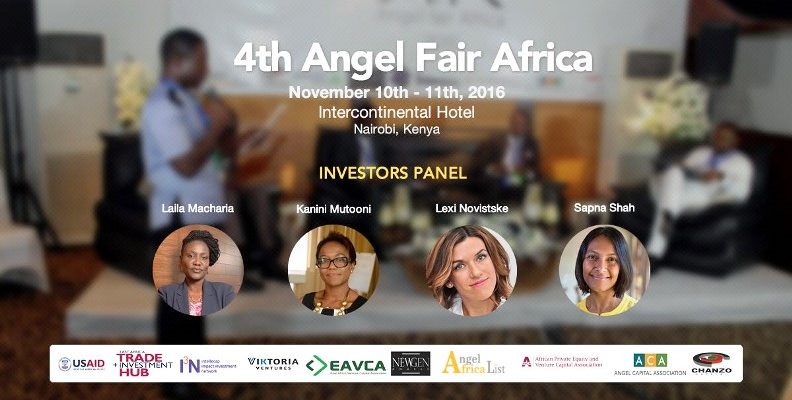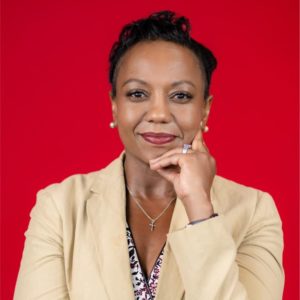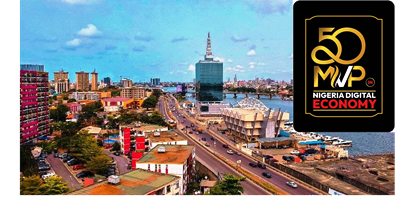A nostalgic walk down memory lane: how far have we come since the first all-female investor panel at the Angel Fair Africa?
By Kanini Mutooni, Africa Managing Director, DRK Foundation.
I remember the first all-female investor panel at Angel Fair Africa 2016 like it was yesterday. At that point in time, the only female fund manager I was even aware of was the amazing Sapna Shah, General Partner (GP) at Novastar. The term “female fund manager” was still considered a misnomer at the time.
RELATED: Angel Fair Africa announces all female investors and entrepreneurs panel at 2020 event
Sapna and I sat on the panel together and talked about early-stage venture capital, and although I cannot recall the details of our conversation, what stood out in my mind was our desire to change the equation in the ecosystem. I wanted to find a way to support more female investors simply because more female investors would typically mean more female entrepreneurs, ultimately leading to greater wealth-creation across Africa.
Reflecting on my own entrepreneurial journey, the most vivid memory I have was one of loneliness. As a black female founder in Berlin, running a SaaS tech platform with no tech experience—but with a kick-ass MBA and about nine years of investment banking experience in the city of London—I thought I had the credentials to make things a little bit easier as a founder.
However, it was incredibly challenging to raise sufficient capital, scale my company, build a sustainable product, and reach profitability (all while raising my three children, all aged three and below). I eventually sold the company after a 5-year run and that experience has become the primary reason I do the work I do today, supporting and investing in entrepreneurs as a female investor. I fully understand the trials they face as I have lived them.
The growth of female fund managers in Africa
After my foray in entrepreneurship reached its conclusion through a small exit, I embarked on a new purpose as an impact investor, starting off by chairing the Global Innovation Fund, a $300m impact fund and one of the first impact vehicles established by five G7 countries. Around the same time, I also had the opportunity to join the inaugral investment committee of the Africa Enterprise Fund, a $200m vehicle providing financing to agribusiness companies across Africa.
It was through these experiences, serving as an investor, with the power to deploy capital, on the other side of the table that I realized how important it was to have a woman actually seated at the investment table, making significant capital deployment decisions.
Female fund managers and investors are now emerging as key players in Africa’s financial ecosystem, driving investments in sectors such as fintech, healthcare, and agribusiness. These women are changing the face of the investment industry by adopting a gender-lens approach that prioritizes women-led businesses and companies that empower underserved communities. Their impact is helping to foster inclusive growth and extend investment opportunities into areas that were previously overlooked by mainstream capital.
Despite their rising profile, female fund managers and investors still face several challenges:
- Access to Networks: Many female fund managers and investors struggle to break into the male-dominated networks that control access to institutional capital.
- Bias in Fundraising: Gender bias leads to skepticism around the abilities of female fund managers to oversee large-scale funds, which can slow down the fundraising process.
- Track Record and Institutional Backing: Without extensive track records, many female fund managers find it difficult to secure large-scale investments from institutional players.
- Non-Traditional Fund Structures: Female fund managers are often more likely to adopt innovative fund structures, such as local currency funds, which may not always align with traditional investor expectations.
Despite these challenges, several female fund managers have succeeded in building firms and driving impactful investments over the last 10 years. Below are a few that stand out with innovative approaches to their fund structure and fundraising process.
Tokunboh Ishmael – Alitheia Capital
- Notable Investments: Alitheia IDF Fund has made key investments in companies such as Pula, a microinsurance firm for smallholder farmers, and Lifestores Healthcare, a healthtech company improving access to medicine.
- Exits: While Alitheia IDF Fund is still growing, its investments are expected to lead to long-term successes.
Maya Horgan Famodu – Ingressive Capital
- Notable Investments: Ingressive Capital has invested in high-growth tech companies like Paystack, acquired by Stripe for $200 million, and Tizeti, an internet service provider.
- Exits: Paystack’s acquisition stands as a landmark exit for the firm.
The list should be much longer and to be fair, there are a large number of female investors in the ecosystem but these female investors are notable for their exits and the companies that they chose to back which were hugely successful.
There are players who are trying to create change in the investor ecosystem and The Mastercard Foundation Africa Growth Fund (MFAGF) is one such stakeholder. By providing working capital loans and backing non-vanilla fund structures like open-ended funds and funds that tie carry to impact milestones, the MFAGF plays a catalytic role in helping female-led funds thrive. I proudly serve on the MFGAF as an Investment Committee Member and the fund’s support has been critical in increasing female GPs access to catalytic capital. The working capital loans offered by MFAGF provide crucial liquidity, helping emerging fund managers scale operations while seeking long-term investment partners.
Kanini Mutooni: The growth of female fund managers and investors in Africa is not just about achieving gender equality in the financial sector; it is about driving economic development.
The fund has also supported the establishment of Flexible Fund Structures by supporting local currency funds and open-ended funds, MFAGF allows managers to structure their investments in ways that align better with Africa’s unique market dynamics, mitigating risks such as currency volatility.
The Moremi Initiative Accelerator is another key player in fostering the growth of female fund managers across Africa. Designed to empower women in leadership, the Moremi Initiative has been instrumental in identifying and developing the next generation of female leaders, including those in the financial and investment sectors. Through its accelerator programs, Moremi provides mentorship, training, and access to networks, enabling emerging female fund managers to build the skills and confidence needed to raise capital, manage funds, and scale their impact.
Moremi’s focus on capacity-building for women in finance ensures that participants not only gain technical expertise but also develop the leadership qualities necessary to succeed in a highly competitive field. By connecting female fund managers with global investors, Moremi plays a vital role in expanding their access to capital and increasing their visibility within the broader investment ecosystem. The accelerator’s holistic approach to nurturing female talent is essential in creating a more inclusive and diversified investment landscape across Africa.
Another influential initiatives driving capital toward female fund managers and investors in Africa is the 2X Challenge, launched by the G7 Development Finance Institutions (DFIs). The 2X Challenge was committed to mobilizing $15 billion by 2022 to support women in business, including female fund managers, entrepreneurs, and women-led enterprises across emerging markets. This initiative has been instrumental in creating an enabling environment for female fund managers by providing access to capital, technical assistance, and visibility.
At Draper Richard Kaplan (DRK) Africa, we’re committed to ensuring that at least 30% of our capital is directed towards female entrepreneurs every year. This isn’t just a checkbox for us; it’s a core part of how we operate, deeply rooted in a clear gender lens investment thesis. As DRK’s Managing Director for Africa, my role is to make sure that our investments reflect the mission set by our founders—backing entrepreneurs who are tackling the continent’s biggest challenges but have the least access to capital. More often than not, these are female founders who are underserved and overlooked, and we’re here to change that.
The growth of female fund managers and investors in Africa is not just about achieving gender equality in the financial sector; it is about driving economic development, fostering innovation, and creating inclusive growth. Female fund managers often invest in early-stage, small, and medium-sized companies—businesses that are critical to Africa’s long-term economic prosperity but are frequently overlooked by traditional investors. These businesses are the engines of job creation, innovation, and social impact. Research shows that female fund managers are more likely to invest in women-led businesses and in sectors that directly address the needs of underserved communities, such as healthcare, education, and financial inclusion. By backing these companies, female fund managers are helping to bridge the gender financing gap and ensure that more diverse voices and solutions are supported. Draper Richard Kaplan’s (Africa’s) approach to allocate a minimum of at least 30% of our capital each year to female entrepreneurs is an example of an investor who actually walk their talk through a well-defined gender lens thesis. My responsibility as DRK’s Managing Director for Africa is to e
I am convinced that had I known a few female investors during my time as an entrepreneur all those years ago, I would have hugely benefitted not just from their capital but their experience and mentorship along my entrepreneurial journey. I have a dream that in the next 20 years every female entrepreneur who embarks on solving an intractable problem will have access to a female investor who takes a real interest in their success.
Moreover, having more female fund managers and investors can help shift the narrative in Africa’s investment ecosystem, encouraging a broader range of investment strategies and fostering more resilient, inclusive economies. Inevitably, female investors have an uncanny ability to balance financial returns with social impact and makes them uniquely positioned to contribute to Africa’s sustainable growth.
In the end, supporting more female investors in Africa is not just a matter of equity; it is a strategic imperative for building a robust, inclusive, and forward-looking investment landscape that benefits all. I feel very excited and privileged to be a part of this promising journey.
I would be convening this year’s all-female investor panel at the 11th Angel Fair Africa from November 7th to 8th 2024 at www.trific.co.ke in Nairobi, Kenya.



































